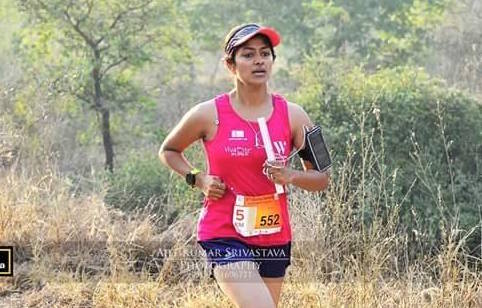
Varda, 34 who lives with the challenges of Myasthenia Gravis took to running to regain muscle strength. As she says: "I chose to run not because it is easy, but because it is hard!" She shares her fight against this neuro-muscular condition.
Please tell us a bit about your condition
I suffer from Myasthenia Gravis. Myasthenia gravis (MG) is an autoimmune disease — a disease that occurs when the immune system attacks the body’s own tissues. In MG, that attack interrupts the connection between nerve and muscle — the neuromuscular junction. MG causes weakness in muscles that control the eyes, face, neck and limbs. Symptoms include partial paralysis of eye movements, double vision, droopy eyelids, weakness & fatigue in the neck and jaws, trouble chewing, swallowing and holding up the head. Muscle weakness in MG gets worse with exertion and improves with rest.
When were you diagnosed?
In 2011-12.
What were the early symptoms?
An early symptom for me was weakness in limbs. After delivering my daughter in 2010, I started experiencing slight difficulties with general chores, and handling my daughter who was just a few months old. I couldn’t comb my hair, lift my arms for more than a few seconds, or lift my baby. Just taking a bath would tire me out.
Later, I started having breathing difficulties, droopy eyelids, trouble jogging and double vision too. After about a year, I ended up taking a lot of supplements for strength, as the doctors thought I was ‘weak’ which caused my limbs to not ‘function’ well. None of them realized the alarming situation, despite my constant complaining that it is ‘something else’ that I can feel, till the time I collapsed like a deck of cards, amidst happily playing with my kid. Fortunately that fall lead us to a neurologist who diagnosed it to be this dreadful chronic illness called MG!
Is there a history of MG in your family?
No
What is your present condition?
After my thymectomy (surgery for thymus gland removal) in 2013, I went into remission, where in the disease lies dormant in your body. Remission can sometimes last for years but can flare up without any warning at any point. A flare-up puts you on bed arrest and you become completely dependent on others to help you. I was blessed to be in remission stage.
I re-started my amateurish jogging in mid-2014 just to get my muscle strength back. Since then there has been no turning back. Running has now become an integral part of my life. Earlier I used to run because I could. Now, I run because everyone, including my own body sometimes tells me I can’t. I chose to run not because it is easy, but because it is hard!

Please describe your experience of managing MG
Life has never been the same after that day when I completely understood what MG was. It took me time to understand and mentally prepare myself to the fact that my muscles will never respond the way I want them to! That may include them not allowing me to get off my bed right in the morning, to not being able to simply comb my hair, or even blush or laugh out loud! My eyes would feel like 50kg weights hanging from my eyelids.
No cure, no cause, no reasons, no answers. You’re left on your own, to fight it out! So you chose, you want to be a VICTIM or a FIGHTER!! And do I need to say, a hell of a fight it has been!
Any related complications?
Complications were during the course of settling the dose of the medicine before surgery, wherein I had bouts of breathing difficulties
What medications are you on?
I was on gravitor/myestin. This is a symptomatic relief medicine as there is no cure. Post-surgery, I take this medicine only SOS.
Were there any side-effects of the medicines?
Yes. This medicine causes non-voluntary muscles of the body to become over- active as well! Thus causing palpitations, incontinence, overactive digestion leading to cramps, etc.
What were some of the challenges you faced and what is your advice to patients who face similar challenges?
Life becomes a challenge itself while you fight with MG.
The biggest challenge is the lack of awareness of this disease. Having to convince not only people around you, but doctors, that you aren't just lying about this disease and that you went through such a long process just to get a diagnosis has been exhausting and painful.
Additionally, lack of awareness of MG among physicians caused a lot of problems. I’d constantly visit doctors in search of an answer, and despite extensive tests got no confirmed diagnosis for a long time because the knowledge of Myasthenia Gravis is very limited. You always have to do your own research. For instance, knowing what type of salts and how much to avoid was challenging.
MG restricts use of common medication use as many drugs can trigger a flare-up. So even a cold/cough medicine needs to be monitored.
Have you learnt anything in managing in your condition that you wish you knew before?
I learnt that asking for help isn’t such a bad thing!
What kind of specialists do you consult and how often?
I visited a neurologist regularly initially (bi weekly/monthly) when the dosage of medicine is to be settled. Later on the visits are less frequent.
A thoracic surgeon was required for my thymectomy,
What resources are available to you in your city to help you manage the condition?
There are no resources for conditions like MG. In fact people fail to understand and acknowledge such rare illnesses.
Have you had to make some changes to your lifestyle because of your condition?
Although I have always been living a healthy life , I truly understood the importance of a fit body after MG. So now, I make sure to give 2 hours each day to my body. I also focus on healthy eating and teach the same to my kid.
Have you tried complementary medicine or therapies, like homeopathy or yoga?
No. The only thing I do for regaining lost strength that has helped is running and exercise.
Has it been difficult emotionally to cope with your condition?
With MG, there are more bad days than good. The worst part is feeling like I have no control over my body, and when the disease is at its worst, feeling like I am trapped inside my body and can't escape.
Also feeling alone and isolated .Others do not know what it is like to live with the condition, especially when it can appear to be invisible from the outside.
Did you see a counselor for support? Were you offered counselling by doctor?
I did not need it.
How did your friends treat you? Were you isolated?
I was mentally strong and had support from parents and my husband.
What was the hardest part of the treatment? What kept you going? How has this changed your life perspectives and ambitions.
The hardest part of the treatment was seeing my one year old daughter grow up in front of me and not be able to do much for her. I was unable to play with her, or indulge in the way I would have wanted. The toughest was when I had to leave her for 10 days, while I went away for my plasmapheresis and surgery.
But what kept me going was the support of my husband and parents and also the thought that I have to fight it out. I had to set an example for her that whatever comes, you never have to GIVE UP!






